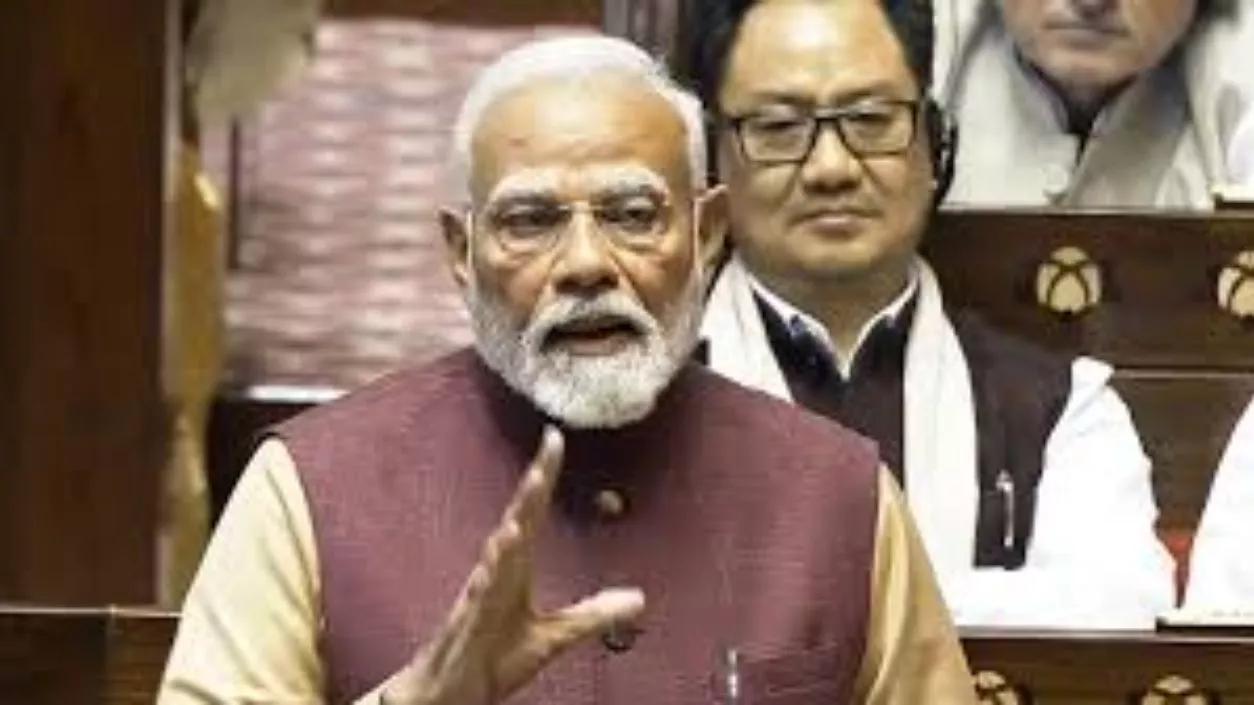.gif)
.gif)

Prime Minister Narendra Modi delivered a detailed address in the Rajya Sabha, where he sharply criticized the historical economic policies of Congress, specifically the "license-permit-quota" system, which he argued hindered India's economic progress for decades. Referring to this period of stagnation as the “Hindu rate of growth,” Modi emphasized that this system slowed down the country’s development, particularly impacting the Hindu community by wrongly associating their growth struggles with their identity. He attributed this stagnation to the policies of Congress, particularly the so-called "Shahi Parivar."
Modi also listed several key infrastructure projects that were delayed under previous administrations, emphasizing the current government's success in overcoming these long-pending issues. One such project was the Saryu Nahar Project in Uttar Pradesh, which was initially approved in 1972 but remained incomplete for nearly five decades. Modi highlighted that the project was finally completed in 2022, benefiting the agriculture sector in the region. Another major project, the Udhampur-Srinagar-Baramulla rail line in Jammu and Kashmir, which was approved in 1994, had remained stalled for 30 years. Modi noted that the project is set to be completed in 2025, marking a significant milestone for the region's connectivity.
The Prime Minister also referenced the impact of Congress's governance on technological progress, criticizing the "license-permit raj" for delaying India’s entry into several global innovations. He pointed out how technologies such as ATMs took decades to be introduced in India, and he also mentioned the delayed adoption of vaccines, such as the BCG vaccine, which were available worldwide but took years to reach India under the slow-paced policies of previous governments. Modi stated that such delays in the adoption of crucial technologies contributed to the stagnation of the nation during Congress’s rule.
Modi’s speech also focused on his government’s emphasis on social welfare, particularly in uplifting marginalized sections of society. He highlighted the PM Vishwakarma Yojna, a scheme aimed at providing skill development and financial inclusion for artisans and traditional workers from the Dalit community. This initiative, which received Rs 24,000 crore in funding, seeks to empower these groups by enhancing their economic opportunities. Additionally, Modi spoke about the Nari Shakti Vandan initiative, which encourages greater participation of women in policy-making, aiming to elevate their roles in leadership and governance.
The Prime Minister further discussed the introduction of a 10% reservation for economically weaker sections (EWS) within the general category. This policy, aimed at benefiting the economically disadvantaged without infringing on the rights of other communities, has been widely accepted. Modi reiterated that the government’s approach is based on the principle of “Sabka Saath, Sabka Vikas,” ensuring development for all sections of society. The policy was framed to provide a fair opportunity to economically weaker families, irrespective of their caste, without affecting reservations for SC, ST, or OBC communities.
In terms of economic growth, Modi spoke about the dramatic rise in India’s toy exports, which have tripled in recent years, reflecting a significant boost to the country’s manufacturing and export sectors. He also mentioned the creation of a separate ministry for the fishing community, which was previously overlooked. This ministry now ensures that fishing communities benefit from credit schemes and financial services similar to those available to farmers. Modi emphasized that these steps demonstrate his government’s commitment to inclusive growth, ensuring that all sectors of society, including the marginalized and rural communities, receive adequate support.